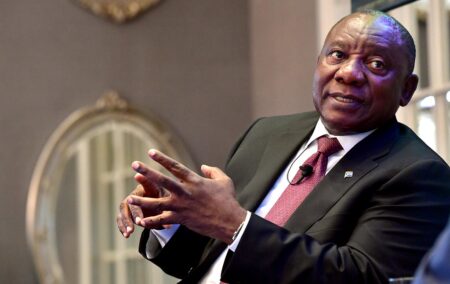President Ramaphosa has cracked the whip on the private sector in his latest weekly newsletter, admonishing those in business for not transforming quickly enough.
Despite the
rhetoric which he repeats at various investor conferences, and general talk
about his government’s intention to roll up its sleeves and bring about real
economic growth, this latest salvo against the private sector will only serve
to undercut the positive things he has said. One presumes he only wants
investment and growth if it is of the ‘right’ kind. If not, it does not appear
that he is truly serious about changing SA’s downward trajectory.
The president is reinforcing the government’s view of itself, the presumption
that it is part of a government’s proper role to dictate to a business what its
racial composition ought to be. This is far removed from a government’s proper
role; this role, properly understood, is to protect individual rights – nothing
more. When governments try to interfere in the economy, as South Africa’s government
has done in terms of racial transformation, the systematic breaking down of the
concept of merit occurs.
The obsession with transformation, with ticking superficial boxes, is going to
result in an ever-shrinking pool of businesses in SA. Apart from the draconian
regulations to which they must adapt, chief amongst which is the National
Minimum Wage, businesses are now hauled over the coals for not forcing through
the government’s artificial, and immoral, edicts.
Enforced diversity is a shallow attempt at addressing the wrongs of the past.
In his speech, the president said: ‘Let us move beyond the psychological
barrier in the interests of rebuilding this country together.’ The president is
unfortunately unaware of the psychological damage these policies will cause.
For the government to impose racial quotas and requirements on private
businesses presumes that black South Africans are incapable of competing with
their white, coloured, and Indian peers, and that the only way they can succeed
is if the government ‘helps’ them. Unfortunately it appears that SA has not
progressed as much as many had hoped since 1994.
Perhaps the president sees transformation as an easy drum to beat – this is
much easier to do than looking at the government’s own many shortcomings and
failures.
We shouldn’t
underestimate the massive damage which has been done to young black South
Africans’ education. Students are dropping out at an alarming rate. Where
companies are making the move to all-digital, students are being underserved
and come out ill-prepared in terms of being technologically proficient. As of
24 November, 9 618 pupils in Gauteng had still not secured a place in a school
(according to Gauteng education MEC Panyaza Lesufi). The atrocious state of
public education is the result of the government’s failures, yet it will not
own up to the fact that it is under-preparing young people, the overwhelming
majority of whom are black, for the corporate world. It is not giving them the
skills they need to compete with current businesses and players in the market.
The president’s comments betray his underlying beliefs and philosophy: that
success is immoral, that wealth is fixed, and that it is the government’s
proper role to interfere in the market and dictate to businesses how they may
or may not act. President Ramaphosa’s way of thinking is mired in the past,
when wealth was taken by force and not created. The president sees business as
inherently a ‘white’ affair which must be shaped by the forceful hand of the
state. There is little to zero room for individual agency and achievement in
this kind of philosophy.
President Ramaphosa referenced a report in his speech: The Commission for
Employment Equity Report 2018- 2019. For as long as we believe people ought to
be employed in a particular job because of the colour of their skin, SA will
not prosper as the president so fervently desires. Prosperity will only come
about if the government drastically reduces the regulations on businesses,
especially small and medium enterprises, and truly allows people to create
wealth for themselves.
The Report itself shows that the government’s own transformation plan, through
the tool of BEE, has been largely unsuccessful. Immoral policies and laws tend
to flounder, and people tend to find a way around them. It would be to the
government’s credit if it did a bit of serious self-reflection on its own
transformation failures.
In imposing its own arbitrary requirements, the government is discouraging true, meaningful diversity; diversity which will arise if people realise they have to work and learn together in a free, competitive market space.
Black-owned South African companies are more numerous now than ever before – they have tried their best to grow, despite the government’s ever-growing list of regulations and taxes. It is an indictment of this government that there could have been an exponentially greater sum of such businesses if only the government had not adopted immoral socialist policies. These policies serve to increase state control over people’s lives and skew the market in favour of entrenched interests, both public and private.
The myriad regulations and socialist policies which have been enforced by successive ANC governments have led to our current state of 0.3% economic growth. President Ramaphosa would be better served in scrapping these policies instead of attacking the private sector, which has carried SA despite the best plans of the state to control each and every aspect of how they operate.
The views of the writer are not necessarily the views of the IRR.

